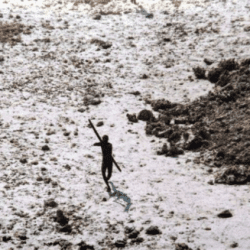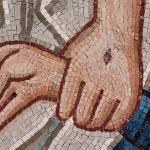This morning I was re-reading one of my favorite stories about Jesus, when he heals the crippled man at the pool of Bethesda. The fact that Jesus is a healer resonates even more deeply with me now, during an epically-bad flu season, where I’m treating more sick people than I ever have in my life.
In the story, there’s a pool called Bethesda that’s just inside one of Jerusalem’s gates. The pool is surrounded by 5 alcoves, where blind and sick and crippled and paralyzed and hurting people sit and wait for an angel to stir the waters. It’s said that the first person to reach the angel-stirred water will be healed. Those who aren’t fast enough to win the race return to their sick beds in the alcoves that line the pool, and they continue to wait.
Jesus enters Bethesda, and encounters a sick man who’s laid by the pool for 38 years — a long, long time to wait.
Jesus asks the man, “Do you want to be well?”
There are lots of reasons why Jesus could have asked that question. Maybe he wanted the man’s consent. Maybe he wanted the man’s participation. Maybe he wanted the man to accept the consequences — good or bad — of beginning a new life outside of the alcove where he’d been living for nearly four decades.
The man answers Jesus by saying, “Yes, but–” Yes, he says, he wants to get well, but he has no one to carry him to the water when the angel stirs it, so he never reaches the healing first.
In an instant, Jesus heals him. “Take your mat, get up and walk,” he says.
And the man does. He rolls up his mat and walks out of that place — the place that holds memories of pain and frustration and doubt and humiliation and despair.
After 38 years, because of the healing love of Jesus, the man just gets up and walks away from the tortured life he’d known.
As I was reading more about the story this morning, I found out what the name of the pool means. In Hebrew, Bethesda means “House of Mercy.” But in Hebrew and in Aramaic, it also means “House of Shame.”
And maybe that’s the whole point of the story. Maybe that’s the reason why Jesus goes there, why Jesus heals there, why, of all the places in Israel where people are suffering, Jesus encounters the invalid there — to remind us that our place of deepest shame is the place of Love’s greatest mercy.
Maybe today you’re hiding in the shadows. Maybe your heart is hurting more than you can stand. Maybe you’re aching to be free from that dark secret that’s holding you captive. Maybe you’re ashamed to let light shine on that unsightly, festering wound. Maybe you’re living in your own Bethesda — a hidden house of lonely shame.
The story of Jesus healing the man who’s waited 38 years by the edge of Bethesda to be well reminds us that our place of deepest shame is the place of Love’s greatest mercy.
Whenever you’re ready, my precious friend, let Light in. Let Love in. Let Mercy carry you the distance you have never been able to go.
When you have the courage to surrender to Grace, you’ll be able to stand on legs that were too weary, too broken, too weak to carry you before.
And for the first time in a very long time — or maybe ever!? — you’ll be deeply, truly, fully free.
















